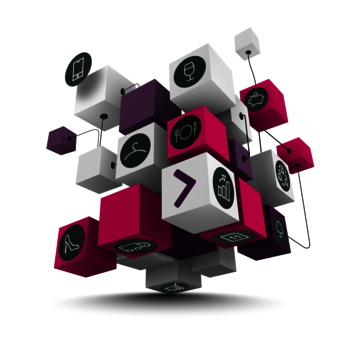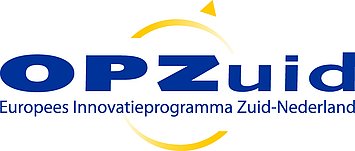Competing against large platforms is increasingly difficult for small and medium-sized enterprises (SMEs) today. Parties such as Amazon and Uber Eats are calling the shots and charging high commissions for the mediation between companies and sales to customers. The smaller entrepreneur therefore has a hard time. MindLabs, Fontys University of Applied Sciences ICT, ROC Tilburg, Binnenstad Management Tilburg and Appsemble decided that this must change. And so it happened: the DRIVE SME project was set up.
Carli and Mark, you are the persons who can tell us everything about DRIVE MKB. Fire away: What does this project entail exactly?
Carli: "DRIVE stands for Sustainable Regional Innovative & Resilient Ecosystem. The goal of this project is to support local SMEs (MKB), focusing on hospitality and retail. We do this by offering help in the digital transformation of a company and by providing the necessary knowledge that this change entails. We want to create a 'low code platform' that SMEs can join. On this platform we share data with each other, for example: which days and times are the busiest in terms of customers? It enables entrepreneurs to adjust their staffing and purchasing accordingly. The platform also functions as a network. Entrepreneurs join forces and become much more resilient. This hopefully makes them less dependent on a large intermediary."
And why is DRIVE MKB really a project for Fontys?
Mark: "In the 1990s, the government gave colleges the task of becoming the innovation partner for SMEs and the social work field. Universities are aimed at the higher segment such as the Shells of this world. HBO is much closer to the professional practice. So it's quite logical that Fontys is collaborating on this innovation from that perspective, because this project is actually exactly the core of that assignment from the 1990s."
Which MindLabs partners are involved in this project?
Carli: "Partners who are now connected are Fontys ICT, ROC Tilburg, tech company Appsemble and Binnenstad Management Tilburg. Already a great club, but we are currently still expanding our network. The nice thing is that every party is really open to working together; there is no competition. As soon as you approach one of the partners for information, they immediately share all the data they have already collected."
What kind of concrete outcomes will the project ideally produce?
Mark: "Hopefully, thanks to DRIVE MKB, various parties will join forces. Take the hospitality industry in Tilburg, for example. Forming a network and analyzing data together has a lot of advantages. It doesn't mean that one business can see exactly who orders what from another business, but it does provide insight into the busiest times. How many staff need to be deployed at that time, or about joint home deliveries of meals. If they were to work together as a collective, they could really take a stand against the large parties. The strength of the local SME lies in the fact that they have a lot of local connections. They know the people and the situations in the city. This project can keep the SME above water. In this way we ensure that the city is not overrun by large chains. It's nice when your favorite little tent, whose owner you may know, continues to exist among all the big boys."
Carli: "Especially during Covid it became clear how vulnerable the target group is. Especially during a lockdown. If you don't have the resources to set up your business digitally, you're immediately 1-0 down in such a situation. You can't keep up with the rest. With a low-code platform, digitization and maintenance becomes easier and more affordable. We really delve into the small businesses and analyze how far they are with digitization. What factors are relevant to them? What training needs are there? And what are they willing or able to outsource? We're trying to extract as much input as possible at this point to really start shaping the project, rather than feeding from an IT capstone. Some companies have already been approached and are excited that digitization is becoming more understandable and approachable. Right now, this still feels like something big and scary, and something expensive and labor-intensive. As a result, to date they often do not dare to take the step towards digitization."
What exactly is your role within the project? What do you mainly occupy yourselves with?
Carli: "I am a project manager and, in this initial phase, a bit of a jack-of-all-trades. I bring parties together to move towards the realization of the final product and in the meantime I pay attention to maintaining the quality of the research."
Mark: "I co-conceived the project and wrote the plan. So I am the applicant. I also agreed with Carli that I am the bouncing ball that gets people excited about and involved in the project."
What do you love about your role and what do you especially like to outsource?
Carli: "Because of my role as project manager, I'm in conversation with everyone. So actually, I'm also kind of in that bouncing around mode of Mark. You discuss great ideas with others and you see connections form. Now that the first publications are out, we get really nice reactions from people. Connecting different parties is what I really enjoy most. What would we rather outsource? Planning all the meetings we have among ourselves."
Mark: "I really enjoy my role because of my social involvement and motivation. SMEs contribute enormously to a vital city center and provide local connection, beautiful environments and initiatives. And not only the quality of life in the city benefits from this, but also the economy; the SME is truly a job engine. I like a lively and authentic city center so much better than a city where I have to think whether I'm in Tilburg or Eindhoven because I only see the same restaurant and store chains.
The project has just started, are there already any highlights that you have experienced and can share?
Mark: "Getting the grant was definitely a highlight."
Carli: "And also the enthusiasm of the colleagues and the resulting collaborations are incredibly nice."
What do you expect the coming period to look like?
Carli: "According to plan, we will put our colleagues and students to work in February 2022. We hope to see the first results of these educational projects before the summer. Then these results should be linked to the research. So let's say, in six months to a year we expect concrete results. What do you think Mark?"
Mark: "In a year we will have gathered a nice group of SMEs. We will have a good understanding of the steps with which we can help them and where we can start. Whether we will already have entrepreneurs using the platform successfully in a year's time? That may be a little too ambitious. But hopefully by then we will have the first pieces of the app and a lot of tangible and useful information."
And looking even further ahead; how will you celebrate this milestone? Because I'm sure there are already creative ideas about that.... Carli: "Then we're going to have a party!"
With that, we conclude. Is it now time for coffee first? Or is there something else on the agenda?
Carli: "I have a lunch meeting about this project that's about to start, so I'll go right on. Bye!"
Mark: "And I have all kinds of appointments with research partners scheduled. So it's a busy day, but there's always room for coffee."
Would you like more information about Drive MKB? Do you know or are you an MKB and would you like to participate in this super cool project? Then send an email to: drivemkb@fontys.nl.
Drive MKB was made possible in part by a contribution from the European Regional Development Fund as part of OP-Zuid.




